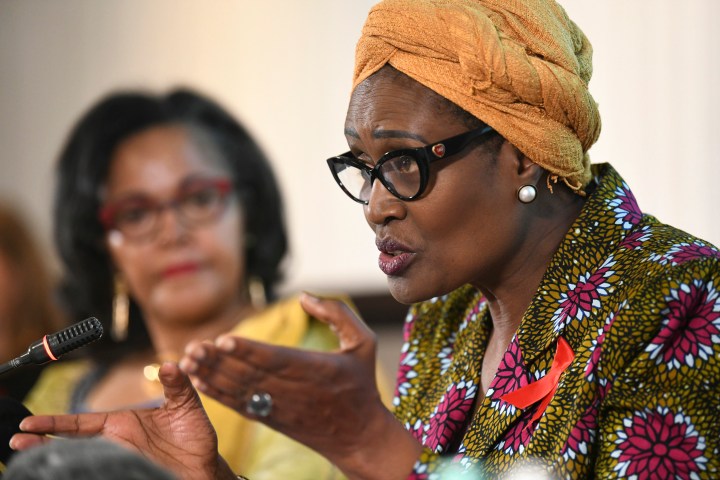HEALTH INNOVATIONS OP-ED
African leadership is essential to overcoming global pandemics

Global inequalities in access to life-saving health innovations are a moral disgrace and a public health danger. But they are not a surprise. We are seeing it now with vaccines for monkeypox. We saw it with Covid-19 vaccines. And we have seen it repeatedly in access to medicines for HIV. Indeed, these inequalities even played out in who got to be heard at the recent International Aids Conference in Montreal, Canada, to which hundreds of brilliant African health leaders were denied the right of entry.
As those of us on the African continent have long pointed out, the Aids pandemic, like other global health crises, is fuelled by inequality. It is in society’s fault lines, etched by inequality, that the pandemic lives and thrives: inequalities between men and women, between rich and poor, between the privileged and the marginalised, between the Global North and the Global South.
Resistance to this inequality led to advocates and activists coming together in a life-and-death struggle to get Covid-19 vaccines to Africa, to lift patents on these vaccines and to allow for vaccine manufacturing on the continent. We are now involved in an identical fight for vaccines against monkeypox; a vaccine that has been in existence for decades but whose stockpile was only released when the virus “jumped” to European and North American shores. And through all this, the world claims to have learnt that epidemics and pandemics know no geographic boundaries; that “we’re all in this together”.
A step change can be achieved
We know how progress against pandemics in the Global South is achieved. It is never given, it is won. The greatest steps forward have come when African civil society movements, scientists and governments have insisted on taking leadership. In the late 1990s, when lifesaving antiretrovirals for HIV treatment were first made available, people in lower-income countries were left excluded from access, resulting in the loss of 12 million lives. But the loud and clear push by activists, scientists and governments led to patents being pushed aside, generic drugs being manufactured and, ultimately, millions of lives being saved.
We can do it again. New long-acting technologies, which enable people to receive an injection every few months instead of having to take a pill every day, can enable a step change in progress on HIV prevention now and in progress on treatment soon. One of the companies holding patents for this technology has agreed to share with some countries. African civil society movements are absolutely right in insisting that all these technologies are shared with all low- and middle-income countries and that we must invest in strengthening productive capacity in Africa.
We can end Aids as a public health threat by 2030. What is needed is not a mystery. The package of evidence-based measures that is needed includes: ensuring equitable worldwide access to the latest prevention, testing and treatment technologies; a stepping up of international and domestic resourcing; localising decision-making and supporting communities, especially the most affected communities, in leadership; empowering women and girls; and realising the full human rights of every person, including by removing discriminatory and punitive laws.
Visit Daily Maverick’s home page for more news, analysis and investigations
What gives us hope that we can end Aids in Africa are the exemplars of African leadership paving the way. Botswana is showing what whole-of-government commitment looks like and the impact that such commitment has, by meeting ahead of schedule the 2025 target of “95-95-95” – where at least 95% of HIV-positive people know their status, 95% of those diagnosed are on medication and 95% of those under treatment show signs that the virus is being suppressed. The mRNA hub in South Africa, and the Pasteur Institute in Senegal, are demonstrating African excellence in science and the potential for Africa to produce our own medicines.
War against HIV – we have the drug to stop it, yet the world is at a turning point once more
The African Union’s assertiveness on the need to revise the international approach to intellectual property in medicine is making it clear how to facilitate tech sharing over tech hoarding. African courts striking down laws which discriminate against minorities are advancing the human rights and health of all. The African leaders who are committing to ramping up investments in health, education and social protection are demonstrating what political will makes possible. And most of all, the community-led groups across the continent who are taking services to the most excluded people, pioneering innovations, and holding duty-bearers to account, are the key drivers of progress.
Faced with systemic inequalities, we cannot wait for an invitation before confronting them. The only way to ensure that we end up on the right side of history is to insist as Africans that we be the makers of that history. DM/MC
Githinji Gitahi is Group Chief Executive Officer of Amref Health Africa. Winnie Byanyima is Executive Director of UNAids and an Under-Secretary-General of the United Nations.
"Information pertaining to Covid-19, vaccines, how to control the spread of the virus and potential treatments is ever-changing. Under the South African Disaster Management Act Regulation 11(5)(c) it is prohibited to publish information through any medium with the intention to deceive people on government measures to address COVID-19. We are therefore disabling the comment section on this article in order to protect both the commenting member and ourselves from potential liability. Should you have additional information that you think we should know, please email [email protected]"



















 Become an Insider
Become an Insider